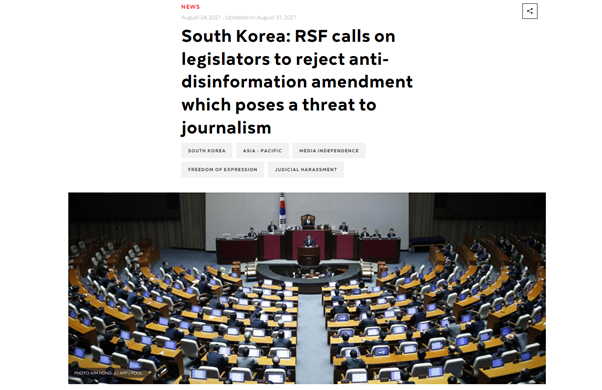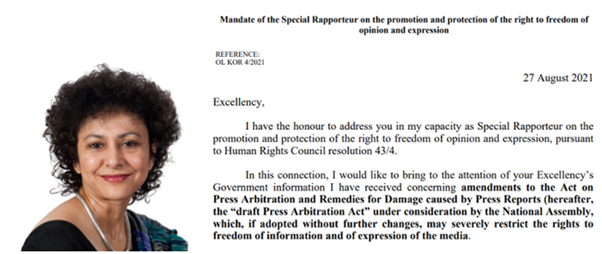‘Amendments to the Press Arbitration Act’ are a hot topic for politicians and journalist who hold sharply divergent opinions about what constitutes ‘healthy journalism’ and ‘freedom of speech.’ The proposed amendments contain regulations that state that if media content is determined to be inappropriate for broadcast, the hosting media must pay the complainant damages of up to five times the actual damages including psychological ones. In addition, it allows the victim to estimate the level of damages if certain reasons are recognized. Overall, the concerns are that the proposed changes are stronger media regulations than ever before. ‘Fake news’ is the main reason behind the introduction of these new rules. Those who view the changes positively think that stronger regulations will help people affected by fake news and guarantee freedom of speech. However, not everyone sees them that way. The news industry is already preparing a constitutional challenge if the amendments are passed. I do not support the ‘Amendments to the Press Arbitration Act.’ There are a few reasons for my opinion. First, excessive punitive damages are replacing the media outlets requirement to simply publish a retraction or correction. Second, the concept of intentional gross negligence lays the burned of innocence on the part of the media outlet. Third, the definition of what is false information is vague, and as a result will force media outlets to deliver safe content that will not expose them to pricey lawsuits, thereby impacting the freedom of the press. Finally, the United Nations have expressed concerns about the legality of the proposed changes in terms of human rights.
 |
| ▲ The article about the concerns of the Reporters Without Borders in this amendment. (Photo from the website of the Reporters Without Border) |
The proposed changes include excessive ‘punitive damage’. If this provision is passed, news outlets and the press would no longer be able to simply issue corrections for the dissemination of false information but would also be liable to pay punitive damages to the complainant of up to five times amount of actual damage including psychological damage. This mere threat of this excessive penalty will suppress the activities of some reporters who write fake news. However, critics argue that is can also suppress reports by journalist who keep state and economic power in check. Writing opinion pieces or satire could result in punitive damages.
Second, there is the problem of ’intentional gross negligence'. This provision assumes that the media intentionally or grossly erred in certain cases, such as violations of the law, non-displaying of correction reports, distortion of article titles, and article contents due to their choice of photos or illustrations. Experts are worried these provisions could be abused by governments intended on gagging the press of criticism for their policies. If politicians don’t like what they read, they could claim punitive damages against the media outlet. As a result, the mere threat of a lawsuit based on the concept of “intentional negligence” could discourage the publication of content critical of the government. Without a critical voice, governments would be left to operate unchecked by the press whose job is normally to hold them accountable for their decisions.
Third, the amendments can also brand all media as ‘cotton pickin’ media. These are media outlets that always carry fake news. Typically, if a complaint is made against a news outlet, they have a responsibility to investigate whether the claim is true or false. People then can judge the truth by looking at objective evidence from both parties. If this law is passed, however, people will believe the news is fake even before the evidence can be presented. Experts said this provision has an element of unconstitutionality because it censors media content without any public discourse. There is some concern that this also violates the international human rights principle that expression cannot be restricted or punished simply for being false.
 |
| ▲ Irene Khan, the UN Special Rapporteur on Freedom of Expression and the document about her concern of the ‘Amendments to the Press Arbitration Act’. (Phot from UN and Hankookilbo) |
Finally, we can’t ignore the negative reception of the proposed changes by the international community. The chairman of the Society of Professional Journalists (SPJ) is strongly worried about this amendment. Dan Kubiske said, “My first impression when I encountered the changes, was extreme disappointment. This kind of law encourages self-censorship.” And, “This is the first time that I know of, where a democratic country has decided to do this. South Korea would be first.” Meanwhile, the Reporters Without Borders also expressed concern that the changes would be a “threat to journalism” and urged the withdrawal of the amendments. The United Nation (UN) joined the list of groups expressing their concerns over the proposed changes. On the OHCHR website, the UN Special Rapporteur on Freedom of Expression said the amendment may seriously affect freedom of speech and urged members to share their concerns with lawmakers. The international community is concerned the amendments could suppress Korean journalism and infringe on freedom of speech, and lead to a democratic rollback beyond the suppression of journalism.
Of course, tough actions are needed to combat the problem of fake news. However, the proposed ‘Amendments to the Press Arbitration Act’ include provisions that will threaten freedom of press and free speech. Therefore, to adopt the proposed changes to the Act, we must first revise the parts that are at risk of being abused due to their vague descriptions. At the same time, the political community should enhance our freedom of speech and the spirit of democracy. Any future policy changes must take a better direction and protect, instead of restrict, our access to free speech.
오유준 dankookherald@gmail.com

![[Campus Magnifier] Let's Surf the Library!](/news/photo/202404/12496_1765_4143.jpg) [Campus Magnifier] Let's Surf the Library!
[Campus Magnifier] Let's Surf the Library!
![[Campus Magnifier] Let's Surf the Library!](/news/thumbnail/202404/12496_1765_4143_v150.jpg)





